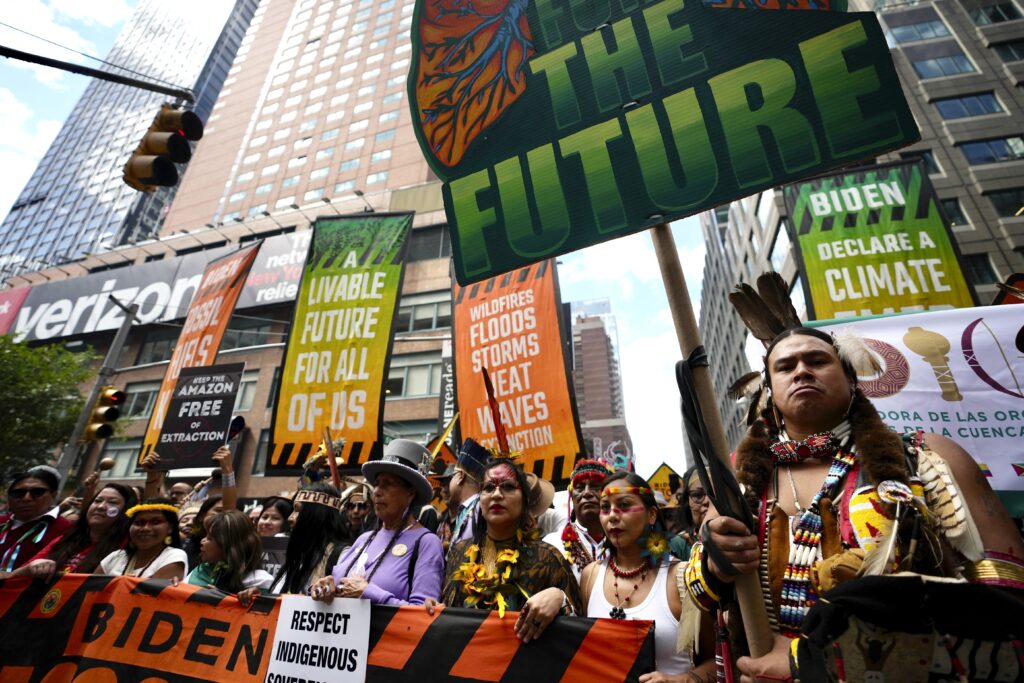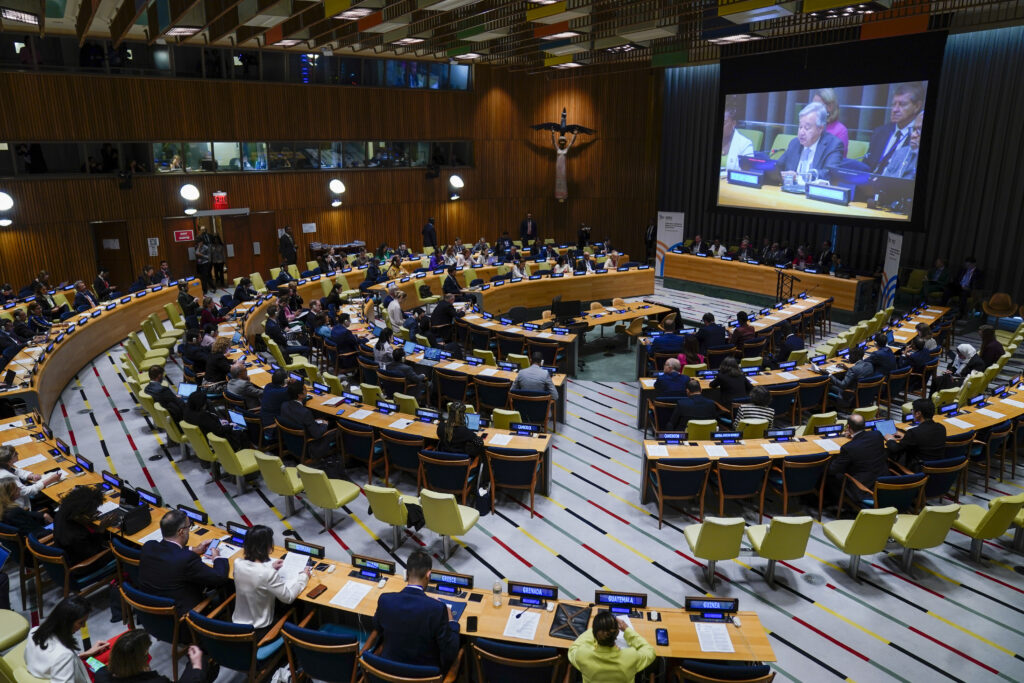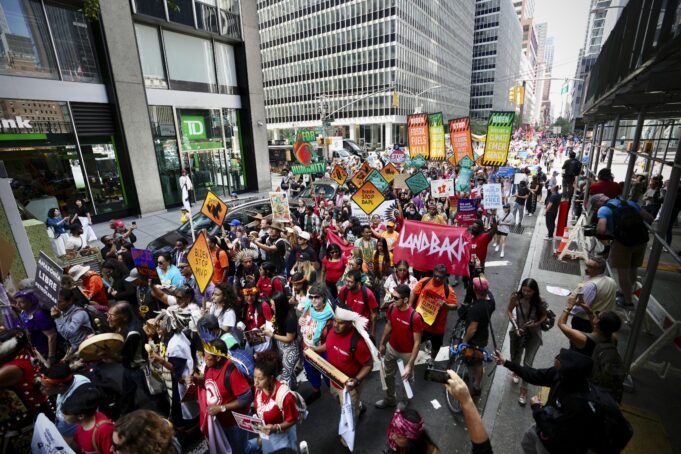And there shall be signs in the sun and in the moon and in the stars, and upon the earth distress of nations, with perplexity. … (Bible: Luke 21:25)
Monarchs, presidents, prime ministers and foreign ministers convened in New York City for the 78th General Assembly of the United Nations to face some of the most pressing problems engulfing the world. The 193-member organization opened the annual UNGA 78 on September 5 and general debates of leaders from September 19-26.
This year’s theme was “Rebuilding Trust and Reigniting Global Solidarity: Accelerating Action on the 2030 Agenda and its Sustainable Development Goals towards Peace, Prosperity, Progress and Sustainability for All.”
“The theme encompasses the recognition that we are at a crossroads in history and that the path ahead will be decisive in determining not only our future but that of generations to come,” said Dennis Francis, Permanent Representative of Trinidad and Tobago to the UN, and president of UNGA 78, announcing the theme in an earlier letter to world leaders.

Mr. Francis, the new president of UNGA 78 was elected from the Group of Latin American and Caribbean States based on a regional rotation of the seat. Setting the tone for the UNGA 78, he called on an extremely fragmented leadership to strengthen multilateralism, trust, and meaningful solidarity to achieve the UN development goals.
The General Assembly gathered under a thick cloud of global crises that some observers argue the UN and leaders have demonstrated an ineptness to solve. Critics of the world body say UNGA 78 marks nearly 80 years of impotence at attaining global peace and harmony. After so many years of meetings, it begs the question of why things are worsening across the world.
Some say the ineffectiveness of the UN bears witness that a time of universal change has arrived to sit down the leaders of war, injustice, tyranny, oppression, exploitation and corruption.
Justice advocates and freedom-loving people have a long history of resistance against the war-makers and oppressors before and after the UN beginning in the aftermath of World War II in 1945.
Among them are words of warning given by the Most Honorable Elijah Muhammad and His National Representative, the Honorable Minister Louis Farrakhan of the Nation of Islam. They warned that the leaders of the world’s nations have reached an impasse to find solutions and pathways to peace.

In the preface of His insightful book “Message to The Blackman in America,” the Most Honorable Elijah Muhammad explains the time and what must be done concerning the global condition. “As we near the exhaustion of the wisdom of this world, which has not been able to shed enough light on our path in search for that Supreme Wisdom to keep us from stumbling and falling, we now seek the wisdom of Allah, the Best Knower and Guide, in the Person of Master Fard Muhammad,” He wrote.
He was referring to His Teacher who came to America from Mecca, Arabia and made Himself known in July 1930, Who Elijah Muhammad taught is the prophesied Messiah of the Christians and Mahdi of the Muslims.
Both the Honorable Elijah Muhammad and Minister Farrakhan described the time as an “old world going out” and a “new world coming in” directed by God, and the confusion of the leaders should be understood in that context.
“Tyrants of the world have to be sat down and a government from God has to be established so that the suffering of humanity will end,” Minister Farrakhan shared in January 2017 on Twitter, the social media platform now called X.
The Minister’s remark is one of many he has given over decades of cautioning world leaders about the dire consequences of their decisions. Collectively for 92 years Minister Farrakhan and his teacher forewarned of a “Universal Government of Peace” being established to eradicate the burden of corruption, injustice, inequality, and misrule on the planet.
Chaotic state of affairs
Since the inception of the UN in 1945, wars have persisted. According to the UN Charter, after World War II, it was formed “to save succeeding generations from the scourge of war,” maintain international peace and security, and prevent and remove any threats to peace. Since the UN was founded, over 480 wars have occurred.
A new war jumps off somewhere in the world on average every two months, said the United Nations Association—UK, which does independent analysis of the UN. “Can anyone really claim that the UN has saved succeeding generations from the scourge of war?” asked the group on their website. The 20th century was a century of the worst wars in the annals of human history. Now, in the second decade of the 21st century, it is more of the same.
All the speeches and posturing about desired peace, “rebuilding trust,” and “reigniting global solidarity,” amounts to lip profession, while the suffering of the world’s most vulnerable goes unabated and nations are dangerously close to nuclear conflict. At UNGA 78, many leaders lamented the worsening state of affairs and the failure to check the downward slide into the abyss.
War continues, hunger continues, recession is increasing, and the climate crisis has shown its teeth as never before claiming thousands of lives, lamented President Gustavo Petro of Colombia in his General Assembly remarks.
“This has been a year where humanity has been losing and has unfailingly hastened the era of extinction,” he said. “All of these crises are in fact, just one crisis: the crisis of life,” reasoned President Petro. “It seems that world leaders have become the enemies of life,” he added, issuing a scathing indictment of them.
During opening remarks on Sept. 19, UN Secretary-General Antonio Guterres delivered a sober report to the General Assembly. “Our world is becoming unhinged,” he said, with geopolitical tensions rising, global challenges mounting, and inequity and injustice persisting.
“And we seem incapable of coming together to respond,” Mr. Guterres told the leaders.
“We confront a host of existential threats from the climate crisis to disruptive technologies, and we do so at the time of chaotic transition,” he said.
The secretary-general said that “global governance is stuck in time” citing the UN Security Council and the economic order that still reflects the political and economic realities of 1945 when many of the UN member states were still under colonial domination.
“The world has changed,” said Mr. Guterres. “Our institutions have not,” he added. “We cannot effectively address problems, as the institutions do not reflect the world as it is.”
Instead of solving problems, he argued, the leaders are becoming part of the problem and are deepening the divides between economic and military powers. He called for a renewal of multilateral institutions based on 21st-century economic and political realities and rooted in equity, solidarity and universality that serves as a global safety net for developing countries in trouble.
“I have no illusions. Reforms are a question of power,” said Mr. Guterres. There are many competing interests and agendas, but the alternative to reform is not the status quo but further fragmentation, he noted. “It is reform or rupture.”
Records will come to account
Other leaders, particularly from Africa and the Global South were poignant to confront the inequities of the global arena.
President Mamadi Doumbouya of Guinea-Conakry said Africa represents a changed space now. Not mincing words, President Doumbouya said the day of African emasculation was over.
“Today, the African people are more awake than ever and more than ever determined to take their destiny into their own hands,” said Mr. Doumbouya, who came to power in a September 2021 coup d’état.
The unequal distribution of wealth, caused by the history of colonialism created endless inequality, famine, and abject poverty, making the daily lives of Africans difficult. “These inequalities are part of the causes for the events that endanger our peaceful coexistence above all,” he said. “When the wealth of a country is in the hands of an elite, while newborns die in hospitals, due to a lack of incubators, it is not surprising that in such conditions we are seeing transitions,” explained Mr. Doumbouya, referring to coups.
Africa suffers from a governance model that was imposed on it and that is good and effective for the West but difficult to adapt to Africa’s reality, customs and environment.
“Through my short but very intense experience of managing the state Guinea, I have come to better understand the extent to which this model has above all contributed to maintaining a system of exploitation and plunder of our resources by others,” he told the General Assembly.
He said the international community must look at Africa with new eyes and engage the continent in genuine cooperation. “The African people are tired,” said, Mr. Doumbouya, “Exhausted by the categorizations” people use to box us in with, he added.
Africa’s population is young and did not experience the Cold War or ideological wars that shaped the world over the 78 years of the UN That is why Africans are insulted at being categorized and placing them at times under the political influence of America, Britain, France, China, Russia or Türkiye.
“We’re neither ‘pro’ nor anti-American … ‘pro’ nor anti-Chinese … ‘pro’ or anti-French, nor ‘pro’ or anti-Russian … ‘pro’ or anti-Turkish. We are simply pro-African,” said Mr. Doumbouya.
In fact, he called the categorizing racist toward a continent of 1.3 billion people and that the era of the old Africa is over. It’s a new day and the end of an unbalanced and unjust era where Africans had no say in the matter. He challenged the West to end its paternalistic and condescending treatment of African nations.
With the boldness exhibited by some leaders like Mr. Doumbouya, and the moaning over the bleak state of world affairs by others, is a sign of a new spirit arising and White world rule fading.
The Honorable Elijah Muhammad said we are living at the end of the world of people who ruled the Black man and his various colors between Black and White for the last 6,000 years and that the God of Justice is present to remove the old order.
Quoting scriptures in His illuminating book, “Our Saviour Has Arrived,” the biblical verse of Matthew 25:32 said, “Before Him shall be gathered all nations.” The Holy Qur’an, the Islamic book of scripture says, “you shall see all nations kneeling before Him and they shall be judged out of their own books.”
The government keeps a record of its governmental accounts. They have books in the library and the courts that document how they ruled the people and a record of how they judged the people.
“The Holy Qur’an says that God will Judge them out of their own books which have the condemnation of their own evil and unjust judgment which they did give out to the people,” wrote the Honorable Elijah Muhammad. “Especially the poor Black slave,” He said.













